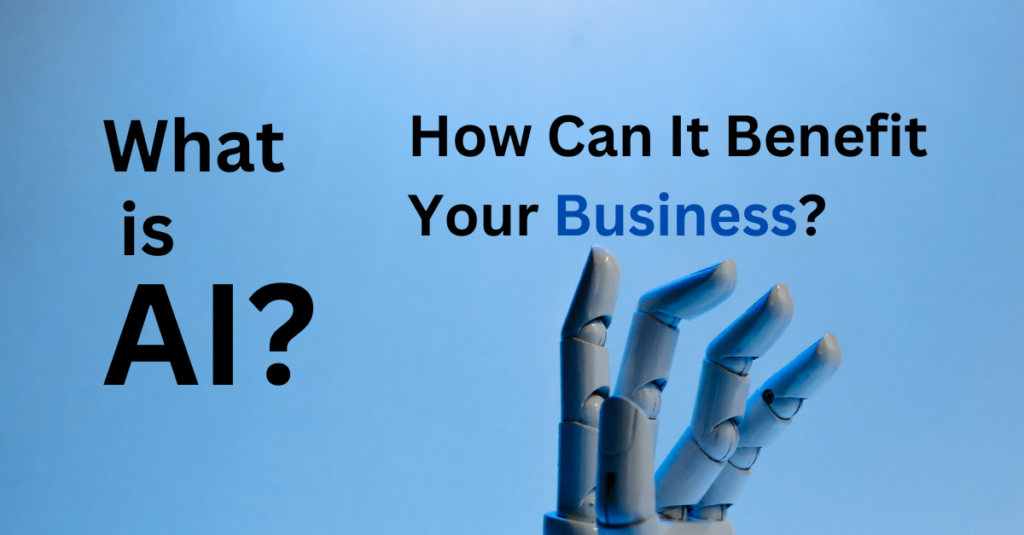Introduction
Artificial Intelligence (AI) is transforming industries by enhancing efficiency, decision-making, and customer experiences. This comprehensive guide delves into AI’s essence, its key benefits for businesses, and practical applications that drive success.
What is AI?
Artificial Intelligence (AI) involves creating systems that can perform tasks typically requiring human intelligence. This includes learning from data (machine learning), understanding natural language (natural language processing), and mimicking human decision-making (neural networks). These technologies enable machines to perform complex tasks, making AI a crucial component of modern business strategies.
Benefits of AI for Businesses
- Enhanced Efficiency and Productivity
- AI automates repetitive and mundane tasks, allowing employees to focus on higher-value activities. For example, AI-powered chatbots can manage customer service inquiries, reducing wait times and improving service quality (U.S. Chamber of Commerce) (Microsoft Cloud).
- Improved Customer Service
- AI tools, like chatbots and virtual assistants, provide 24/7 customer support, offering quick and accurate responses. They use natural language processing to understand and address customer needs, leading to higher satisfaction and loyalty (U.S. Chamber of Commerce) (Wharton Online).
- Data-Driven Decision Making
- AI systems analyze large datasets to uncover patterns and insights, facilitating informed decision-making. Predictive analytics can forecast trends, optimize inventory, and tailor marketing strategies to individual customer behaviors (SCORE) (Western Governors University).
- Personalized Customer Experiences
- AI algorithms track and analyze customer preferences, enabling businesses to offer personalized product recommendations and targeted marketing. This personalization enhances customer engagement and drives sales (NeoITO) (Western Governors University).
- Cost Reduction
- Automating processes with AI reduces operational costs. AI optimizes supply chain management, reduces waste, and improves logistics efficiency, leading to significant cost savings (NeoITO).
In-Depth Practical Applications of AI in Business
- Marketing and Sales
- AI enhances marketing strategies by segmenting audiences and creating personalized campaigns. AI tools analyze customer data to provide tailored product recommendations and improve customer retention. For instance, Amazon’s recommendation engine, powered by AI, drives a significant portion of its sales (IBM – United States) (NeoITO).
- Customer Support
- AI chatbots and virtual assistants handle common inquiries and provide instant support, freeing up human agents to tackle more complex issues. These tools improve response times and customer satisfaction by offering quick and accurate solutions (U.S. Chamber of Commerce) (SCORE).
- Operations and Supply Chain Management
- AI optimizes supply chain operations by predicting demand, managing inventory, and improving logistics. AI tools analyze data to forecast needs and streamline operations, reducing costs and improving efficiency. Companies like Walmart and Amazon leverage AI to enhance their supply chain processes (Microsoft Cloud).
- Human Resources
- AI revolutionizes recruitment by screening resumes, scheduling interviews, and assessing candidates. AI-powered tools evaluate candidates’ fit based on data, reducing bias and improving the quality of hires. For example, PepsiCo used AI to automate its recruitment process, saving time and resources (NeoITO).
- Financial Services
- AI enhances financial operations through fraud detection, risk management, and automated trading. AI systems analyze transaction patterns to identify fraudulent activities and manage risks effectively. Additionally, AI-powered trading platforms execute trades based on real-time data analysis, improving accuracy and speed (Western Governors University).
Conclusion
Artificial Intelligence offers transformative potential for businesses, enhancing efficiency, customer service, decision-making, and cost savings. By understanding and leveraging AI, businesses can stay competitive and thrive in today’s fast-paced digital landscape.




